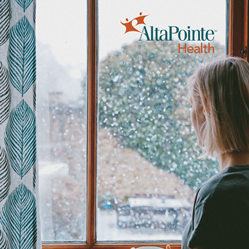
MOBILE, Ala. (PRWEB)
March 19, 2020
As COVID-19 spreads across the nation, the Centers for Disease Control and other healthcare experts call for us to practice social distancing and, in some cases, self-quarantine to help stop the spread of the coronavirus. However, social distancing and quarantine can be especially difficult for people who have underlying mental health issues.
Cindy Gipson, Ph.D., serves as the assistant director of intensive services for AltaPointe Health and offers the following tips for staying connected in positive ways during these uncertain times.
-
Tune out media that can produce anxiety or fear. It is okay to stay informed but do not spend more than 30 minutes a day on news media. Find out what you need to know to be safe then tune out. - Tune in to your support system. Reach out to family and friends by text or phone so that you stay connected and share information about your day, your hobbies, or your concerns.
- Tune out, negative people. You don’t need doom and gloom right now. Keep it positive or keep it moving!
- Tune in to your resources. If you need more support than you can get from friends and family, reach out to your mental health professionals. We are still here to make sure you get what you need, and there are many ways we can help by phone.
- Remember, YOU control the ability to tune in or tune out. Focus on the positive and do something that makes you feel productive at home and take comfort in talking with friends and family by phone. We are going to get through with the support of each other!
AltaPointe Health is Alabama’s largest and most comprehensive health and human services organization and psychiatric hospital system. It is the second largest in the southeastern US serving Mobile, Baldwin, and Washington counties in south Alabama and Clay, Coosa, Randolph, and Talladega counties to the north. Each year it provides mental health, substance abuse, and intellectual disability services to more than 35,000 children and adults.
Share article on social media or email:

